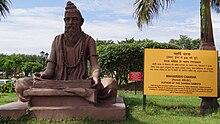Charaka
Indian physician and academic
Charaka (Sanskrit: चरक, romanized: Caraka, fl. c. 100 BCE – 200 CE[1]) was one of the principal contributors to Ayurveda, a system of medicine and lifestyle developed in Ancient India. He is known as the compiler or editor (Sanskrit: प्रतिसंस्कर्ता, romanized: pratisaṁskartā) of the medical treatise entitled Charaka Samhita (Sanskrit: चरकसंहिता, romanized: Carakasaṁhitā). Charaka has been identified as a native of Kashmir. The treatise that Charaka compiled is one of the foundational treatises of classical Indian medicine and is regarded one among the Brihat-Trayee (the Greatest - trio) of Ayurveda (Sanskrit: आयुर्वेद, romanized: āyurvēda).

Quotes
edit- Charaka composed a Samhita (or encyclopedia) of medicine, which is still used in India, and gave to his followers an almost Hippocratic conception of their calling: “Not for self, not for the fulfilment of any earthly desire of gain, but solely for the good of suffering humanity should you treat your patients, and so excell all.” Only less illustrious than these are Vagbhata (625 A.D.), who prepared a medical compendium in prose and verse, and Bhava Misra (1550 A.D.), whose voluminous work on anatomy, physiology and medicine mentioned, a hundred years before Harvey, the circulation of the blood...
- Will Durant, Our Oriental Heritage : India and Her Neighbors.